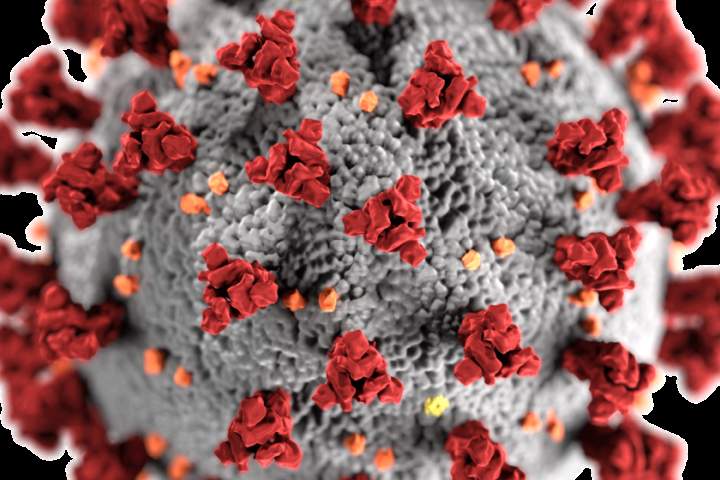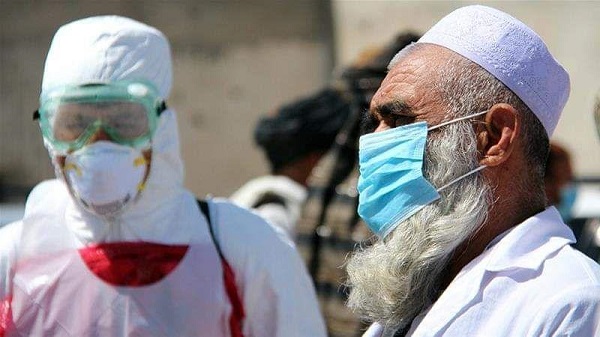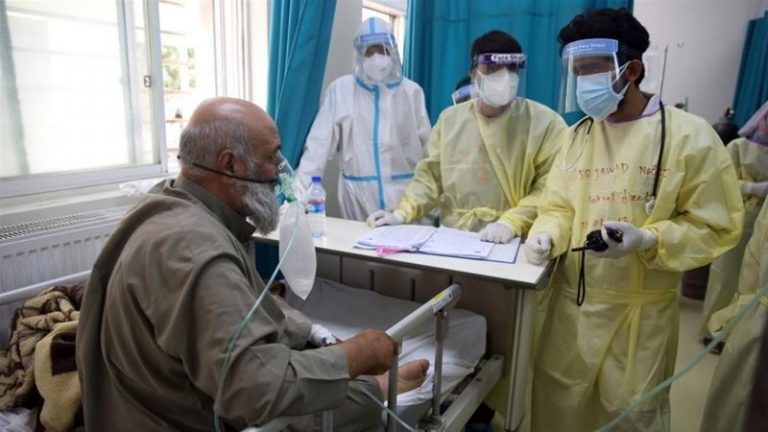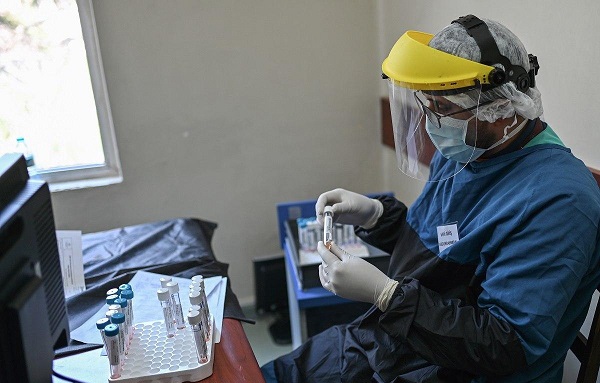The first COVID-19 case in Afghanistan was confirmed in Herat province on February 24, 2020[1]. A 35-year-old man who had returned from Qom, Iran, was the first recorded patient. Even as the country braced for the pandemic and tried to take precautions, there have been 8,145 positive cases (May 20, 2020).
Publish dateThursday 21 May 2020 - 14:27
Story Code : 210482
With the number of cases going up daily, Afghanistan is struggling with a myriad of problems including an overloaded healthcare infrastructure, lack of testing kits and preventative equipment, influx of people from Iran and Pakistan, and even increased Taliban activity.
In the early days, one of the responses to the spread of the Coronavirus in Afghanistan, the Afghan government established the Emergency Committee for Prevention of COVID-19 to manage intra-governmental efforts to battle the pandemic and any chaotic situation that might arise as a result.
Following its establishment, one of the Committee’s first request was a restriction of movement in Kabul city. This was taken into account and the Afghan cabinet approved a “strategy to impose certain restrictions on public movement in capital Kabul” effective from March 28, 2020, to prevent the spread of Coronavirus. The measured lockdown was imposed for at least a period of three weeks and all the citizens of Kabul were asked to stay at home, avoid any non-essential movement and social gathering. Restaurants and supermarkets were also closed. The Emergency Committee also stepped in and provided aid to families in Kaul by distribution food.
On the administrative front, all activities of government departments in Kabul, except the Ministry of Public Health and the security forces, were banned. The Independent Administrative Reform and Civil Service Commission announced that to check the spread of the virus, Civil Servants will be on leave for three weeks, which was later extended[2].
The widespread closures of all government offices, non-essential services and non-profit organisations in Kabul, left a large number of citizens unemployed. The spread of Coronavirus created a social and economic crisis with far-reaching consequences such as the rapid social and economic developments/changes in the families.
To gauge this social change, Reporterly undertook a field survey from April 28 to May 5, 2020, through social media networks such as Facebook, online messaging/texting via WhatsApp and Telegram as well as telephone calls to collect information from various segments of Kabul locals. More than 200 people sent in their response. However, due to some data collection errors, only 200 forms were shortlisted and analysed for the final report. Therefore, we have used the information of 200 participants from different parts of Kabul city, and people from different ethnicities and walks of life, including women and men, to examine various challenges related to the imposition of the citywide lockdown in Kabul.
Research methodology
The research is based on a primary field survey conducted via social network (Facebook), messaging applications (Telegram, WhatsApp), and telephone calls from April 28-May 5, 2020. Once the data was collected it was classified, sorted, and analysed.
Demographic details of respondents

There were 200 survey responses which were shortlisted for analysis. Based on gender, there were 150 men and 50 women who participated. The educational status varied, with 143 people holding a Bachelor’s degree followed by 31 who had a Masters. The majority of respondents, 50, were students, followed closely by 41 who were journalists.
Ethnically, 75 were Hazaras, and 61 identified as Tajik.

When asked about their location, 66% people responded they were from Kabul city. Only 68 people further specified their location.
 1- Have you heard about the Coronavirus (COVID-19) disease?
1- Have you heard about the Coronavirus (COVID-19) disease?
Coronavirus has become a global epidemic, and almost everyone has heard of it, but some still believe that it is a conspiracy and that there is no actual virus. All the 200 respondents said they were aware about the Coronavirus pandemic.

2- What are the symptoms of Coronavirus?
After Coronavirus spread, one of the issues discussed by everyone were the myriad symptoms and indicators to look for. Although doctors and physicians have identified some common symptoms, they tend to differ across patients. This question was asked to gauge the awareness of the citizens to see how many symptoms they could identify. A majority of them, 176 respondents, knew about fever; 150 knew about dry cough.

3- Has anyone close to you tested positive for Coronavirus yet?
While Afghanistan has been hit hard by Coronavirus, the number of cases has been lower than many of its neighbours. This has led to discussions and questions about what factors made the Afghan populace less susceptible to the virus than other countries. Many even argued that official statistics are not reflecting the real scenario. The intention of this question was to find out the percentage of people infected with the virus among the participants. According to the respondents, only 8% of them knew anyone who had been infected with Coronavirus.
 3.1- If you know someone who was infected with Coronavirus, then what is their current status?
3.1- If you know someone who was infected with Coronavirus, then what is their current status?
17 out of 200 people knew others, relatives and acquaintances, who had been infected and had tested positive for the Coronavirus since February 2020. The respondents knew 59 people in total who had tested positive. Of the infected, 43 had made a complete recovery while five people had died. There were 11 people who were still undergoing treatment at various care facilities.

4- Are you worried that you would contract Coronavirus?
Due to the extremely infectious nature of Coronavirus, many people have concerns about contracting the disease. On a qualitative scale ranging from ‘Extremely worried’ to ‘Not Worried,’ most people were concerned about getting infected. Only 52 respondents were not worried at all.

5- What have you done to prevent getting infected with Coronavirus?
Different ways to prevent contracting Coronavirus have been recommended by the World Health Organisation. Afghanistan, like many other countries, has followed protocol and called for a complete lockdown wherein it has closed its land and sea borders, and restricted air travel. On being asked what they were doing personally, 194 respondents said they were taking some protective measures.

6- If you contract COVID-19, what would you do?
A rising concern for Afghanistan has been the overburdened and overcrowded healthcare facilities as medical personnel struggle to manage and treat the growing number of Coronavirus patients. There is also a general distrust of government-owned hospitals. The highly infectious nature of COVID-19 has highlighted the lack of medical infrastructure in the country. When asked what they would do if they test positive for Coronavirus, majority of respondents said they would prefer receiving treatment from home.

7- How much do you trust public health institutions?
During the pandemic, there is a heavy reliance on public health institutions to manage Coronavirus patients as the lockdown intensified nationalism and redrew global borders. In the current scenario, 28 respondents had no faith in Afghanistan’s public health institutions and only 7 people completely trusted them. On an average, people had 36% trust in government-owned healthcare facilities.

Economic Indicators
1- Are you on leave or have you continued to work during lockdown?
The Coronavirus pandemic has had a direct effect on people’s employment situation. Majority of respondents, 107, said their offices were closed; 75 said they continue to work but seven said they were unemployed.
 2- Have you received any assistance during quarantine?
2- Have you received any assistance during quarantine?
With the onset of the pandemic, many countries have provided monetary and material assistance to their citizens, be they the elderly, the unemployed, or the daily wage labourers. In Afghanistan, where median incomes are low and poverty is high, the need for government assistance is felt more than ever. 192 (96%) of our respondents said they had not received any government support.

3- What is your current economic situation?
Given that the economic situation of the majority of Kabul citizens is dependent on working outside their homes, the lockdown undoubtedly caused a disruption in their economic condition. A lack of government support and delays in international efforts are further degrading the situation. The question asked our respondents to mark their current economic condition on a qualitative scale. Only 52 people said they were doing good. Six people (3%) did not respond.

Social Indicators
1- Have you met with friends or others socially since Kabul city went into lockdown?
One of the concerns of most Kabul citizens these days is complying with the quarantine restrictions, as one of the ways in which Coronavirus can be transmitted is through contact with infected people. Close to 95% (189) of our respondents adhered to the restrictions and did not engage in any social or group gathering during the quarantine.
2- What has become the alternative to your social relationships?
Man is a social animal and require an environment in which they can maintain social ties. While the lockdown does not allow physical interactions, people have opted for other methods to stay in touch. Over 150 respondents said they have become active on social media to maintain contact with others. There were 17 people who said they rely on phone calls to keep in touch. However, there were five people who said their social ties had been completely broken due to the quarantine.

3- Has your behaviour at home changed since the quarantine?
The Coronavirus has left a profound impact on the social and family life of people in different societies. The movement restrictions have forced people to stay indoors and this has affected their behaviour. 50% of our respondents said the way they behave at home has changed compared to the past.
4- If yes, how has it changed?
Of the 100 respondents who said they noticed a change in their behaviour, they were asked what they observed. As the answers varied, they have been categorised to the best of our capability for analysis.

5- What activities do you do at home to stay entertained?
The quarantine experience of staying home for long periods of time may cause boredom. While it is a little problematic initially to adjust to, people tend to participate in many activities to stay entertained and/or busy. A large percentage of respondents, 45%, said they took up reading, to keep themselves entertained.

6- Do you do housework and participate in chores?
Since large numbers of people are at home, they have found various avenues to entertain themselves. 59% of our respondents said they do not participate in household chores of any kind.
7- If yes, what activities do you do at home?
In response to the previous question, 41% respondents said that they work at home following the lockdown and imposition of movement restriction in Kabul city. The following are the tasks they engage in, with 55 people saying they cook.

Conclusion
The Coronavirus outbreak has had a deep impact on all aspects of a regular Kabul residents’ life. Of our 200 respondents to the survey, all knew about the pandemic.
The vast majority of respondents are aware of the symptoms of the Coronavirus, and ways to prevent the virus, with 61% of respondents worried, to varying degrees, about contracting the virus, and 43% of respondents said they have observed/followed the quarantine and stayed at home to prevent infection. Another 54% said they go out using masks and gloves, and wash their hands with soap to protect themselves from the virus.
After the outbreak of the Coronavirus in Kabul, the Afghan government set up the Emergency Committee for Prevention of COVID-19 that imposed a lockdown in Kabul and restricted movement across the city. This barrier to normal, everyday life, has affected many people, leaving them unemployed and struggling to meet daily expenses.
The lockdown has adverse consequences with 53% of respondents stating their offices remained shut. Also, 96% of respondents said that they had not received any government assistance during the quarantine.
The impacts of the virus are not just limited to health and economy, but has also impacted the social life of Kabul citizens. According to 50% of respondents, since the imposition of movement restrictions due to Coronavirus outbreak, their social and family relationships have changed in ways where they get nervous or lose their temper. Though the virus has brought many challenges, its positive impact has also been noted by some people who said they were able to get more intimate with their family members due to the lockdown.
To view the PDF version of the survey, click here.
[1] Reporterly, Afghanistan’s doctors brace for impact as first positive coronavirus case detected, http://reporterly.net
[2] Khabarnama, The first quarantine restrictions in Kabul
In the early days, one of the responses to the spread of the Coronavirus in Afghanistan, the Afghan government established the Emergency Committee for Prevention of COVID-19 to manage intra-governmental efforts to battle the pandemic and any chaotic situation that might arise as a result.
Following its establishment, one of the Committee’s first request was a restriction of movement in Kabul city. This was taken into account and the Afghan cabinet approved a “strategy to impose certain restrictions on public movement in capital Kabul” effective from March 28, 2020, to prevent the spread of Coronavirus. The measured lockdown was imposed for at least a period of three weeks and all the citizens of Kabul were asked to stay at home, avoid any non-essential movement and social gathering. Restaurants and supermarkets were also closed. The Emergency Committee also stepped in and provided aid to families in Kaul by distribution food.
On the administrative front, all activities of government departments in Kabul, except the Ministry of Public Health and the security forces, were banned. The Independent Administrative Reform and Civil Service Commission announced that to check the spread of the virus, Civil Servants will be on leave for three weeks, which was later extended[2].
The widespread closures of all government offices, non-essential services and non-profit organisations in Kabul, left a large number of citizens unemployed. The spread of Coronavirus created a social and economic crisis with far-reaching consequences such as the rapid social and economic developments/changes in the families.
To gauge this social change, Reporterly undertook a field survey from April 28 to May 5, 2020, through social media networks such as Facebook, online messaging/texting via WhatsApp and Telegram as well as telephone calls to collect information from various segments of Kabul locals. More than 200 people sent in their response. However, due to some data collection errors, only 200 forms were shortlisted and analysed for the final report. Therefore, we have used the information of 200 participants from different parts of Kabul city, and people from different ethnicities and walks of life, including women and men, to examine various challenges related to the imposition of the citywide lockdown in Kabul.
Research methodology
The research is based on a primary field survey conducted via social network (Facebook), messaging applications (Telegram, WhatsApp), and telephone calls from April 28-May 5, 2020. Once the data was collected it was classified, sorted, and analysed.
Demographic details of respondents

There were 200 survey responses which were shortlisted for analysis. Based on gender, there were 150 men and 50 women who participated. The educational status varied, with 143 people holding a Bachelor’s degree followed by 31 who had a Masters. The majority of respondents, 50, were students, followed closely by 41 who were journalists.
Ethnically, 75 were Hazaras, and 61 identified as Tajik.

When asked about their location, 66% people responded they were from Kabul city. Only 68 people further specified their location.
 1- Have you heard about the Coronavirus (COVID-19) disease?
1- Have you heard about the Coronavirus (COVID-19) disease?Coronavirus has become a global epidemic, and almost everyone has heard of it, but some still believe that it is a conspiracy and that there is no actual virus. All the 200 respondents said they were aware about the Coronavirus pandemic.

2- What are the symptoms of Coronavirus?
After Coronavirus spread, one of the issues discussed by everyone were the myriad symptoms and indicators to look for. Although doctors and physicians have identified some common symptoms, they tend to differ across patients. This question was asked to gauge the awareness of the citizens to see how many symptoms they could identify. A majority of them, 176 respondents, knew about fever; 150 knew about dry cough.

3- Has anyone close to you tested positive for Coronavirus yet?
While Afghanistan has been hit hard by Coronavirus, the number of cases has been lower than many of its neighbours. This has led to discussions and questions about what factors made the Afghan populace less susceptible to the virus than other countries. Many even argued that official statistics are not reflecting the real scenario. The intention of this question was to find out the percentage of people infected with the virus among the participants. According to the respondents, only 8% of them knew anyone who had been infected with Coronavirus.
 3.1- If you know someone who was infected with Coronavirus, then what is their current status?
3.1- If you know someone who was infected with Coronavirus, then what is their current status?17 out of 200 people knew others, relatives and acquaintances, who had been infected and had tested positive for the Coronavirus since February 2020. The respondents knew 59 people in total who had tested positive. Of the infected, 43 had made a complete recovery while five people had died. There were 11 people who were still undergoing treatment at various care facilities.

4- Are you worried that you would contract Coronavirus?
Due to the extremely infectious nature of Coronavirus, many people have concerns about contracting the disease. On a qualitative scale ranging from ‘Extremely worried’ to ‘Not Worried,’ most people were concerned about getting infected. Only 52 respondents were not worried at all.

5- What have you done to prevent getting infected with Coronavirus?
Different ways to prevent contracting Coronavirus have been recommended by the World Health Organisation. Afghanistan, like many other countries, has followed protocol and called for a complete lockdown wherein it has closed its land and sea borders, and restricted air travel. On being asked what they were doing personally, 194 respondents said they were taking some protective measures.

6- If you contract COVID-19, what would you do?
A rising concern for Afghanistan has been the overburdened and overcrowded healthcare facilities as medical personnel struggle to manage and treat the growing number of Coronavirus patients. There is also a general distrust of government-owned hospitals. The highly infectious nature of COVID-19 has highlighted the lack of medical infrastructure in the country. When asked what they would do if they test positive for Coronavirus, majority of respondents said they would prefer receiving treatment from home.

7- How much do you trust public health institutions?
During the pandemic, there is a heavy reliance on public health institutions to manage Coronavirus patients as the lockdown intensified nationalism and redrew global borders. In the current scenario, 28 respondents had no faith in Afghanistan’s public health institutions and only 7 people completely trusted them. On an average, people had 36% trust in government-owned healthcare facilities.

Economic Indicators
1- Are you on leave or have you continued to work during lockdown?
The Coronavirus pandemic has had a direct effect on people’s employment situation. Majority of respondents, 107, said their offices were closed; 75 said they continue to work but seven said they were unemployed.
 2- Have you received any assistance during quarantine?
2- Have you received any assistance during quarantine?With the onset of the pandemic, many countries have provided monetary and material assistance to their citizens, be they the elderly, the unemployed, or the daily wage labourers. In Afghanistan, where median incomes are low and poverty is high, the need for government assistance is felt more than ever. 192 (96%) of our respondents said they had not received any government support.

3- What is your current economic situation?
Given that the economic situation of the majority of Kabul citizens is dependent on working outside their homes, the lockdown undoubtedly caused a disruption in their economic condition. A lack of government support and delays in international efforts are further degrading the situation. The question asked our respondents to mark their current economic condition on a qualitative scale. Only 52 people said they were doing good. Six people (3%) did not respond.

Social Indicators
1- Have you met with friends or others socially since Kabul city went into lockdown?
One of the concerns of most Kabul citizens these days is complying with the quarantine restrictions, as one of the ways in which Coronavirus can be transmitted is through contact with infected people. Close to 95% (189) of our respondents adhered to the restrictions and did not engage in any social or group gathering during the quarantine.
2- What has become the alternative to your social relationships?
Man is a social animal and require an environment in which they can maintain social ties. While the lockdown does not allow physical interactions, people have opted for other methods to stay in touch. Over 150 respondents said they have become active on social media to maintain contact with others. There were 17 people who said they rely on phone calls to keep in touch. However, there were five people who said their social ties had been completely broken due to the quarantine.

3- Has your behaviour at home changed since the quarantine?
The Coronavirus has left a profound impact on the social and family life of people in different societies. The movement restrictions have forced people to stay indoors and this has affected their behaviour. 50% of our respondents said the way they behave at home has changed compared to the past.
4- If yes, how has it changed?
Of the 100 respondents who said they noticed a change in their behaviour, they were asked what they observed. As the answers varied, they have been categorised to the best of our capability for analysis.

5- What activities do you do at home to stay entertained?
The quarantine experience of staying home for long periods of time may cause boredom. While it is a little problematic initially to adjust to, people tend to participate in many activities to stay entertained and/or busy. A large percentage of respondents, 45%, said they took up reading, to keep themselves entertained.

6- Do you do housework and participate in chores?
Since large numbers of people are at home, they have found various avenues to entertain themselves. 59% of our respondents said they do not participate in household chores of any kind.
7- If yes, what activities do you do at home?
In response to the previous question, 41% respondents said that they work at home following the lockdown and imposition of movement restriction in Kabul city. The following are the tasks they engage in, with 55 people saying they cook.

Conclusion
The Coronavirus outbreak has had a deep impact on all aspects of a regular Kabul residents’ life. Of our 200 respondents to the survey, all knew about the pandemic.
The vast majority of respondents are aware of the symptoms of the Coronavirus, and ways to prevent the virus, with 61% of respondents worried, to varying degrees, about contracting the virus, and 43% of respondents said they have observed/followed the quarantine and stayed at home to prevent infection. Another 54% said they go out using masks and gloves, and wash their hands with soap to protect themselves from the virus.
After the outbreak of the Coronavirus in Kabul, the Afghan government set up the Emergency Committee for Prevention of COVID-19 that imposed a lockdown in Kabul and restricted movement across the city. This barrier to normal, everyday life, has affected many people, leaving them unemployed and struggling to meet daily expenses.
The lockdown has adverse consequences with 53% of respondents stating their offices remained shut. Also, 96% of respondents said that they had not received any government assistance during the quarantine.
The impacts of the virus are not just limited to health and economy, but has also impacted the social life of Kabul citizens. According to 50% of respondents, since the imposition of movement restrictions due to Coronavirus outbreak, their social and family relationships have changed in ways where they get nervous or lose their temper. Though the virus has brought many challenges, its positive impact has also been noted by some people who said they were able to get more intimate with their family members due to the lockdown.
To view the PDF version of the survey, click here.
[1] Reporterly, Afghanistan’s doctors brace for impact as first positive coronavirus case detected, http://reporterly.net
[2] Khabarnama, The first quarantine restrictions in Kabul
Source : Afghan Voice Agency(AVA)
avapress.net/vdcg7z9xxak9qt4.5jra.html
Tags
Top hits












